#Achaeans
Note
Hii,
I was wondering if you could tell me (if you know, of course) what the ancient Greeks of the Mycenaean times called themselves.
I was trying to look it up myself for a project but all the info I got was so inconclusive and one article went against the other and I'm honestly so confused.
I really wanted to answer this because I remember we talked about it in A' class in Gymnasio!! (Our History book also wrote a bit about that). We are almost sure, as we have very strong historical elements for speculation.
If you've read the Iliad and Odyssey in English, the Greeks (who came from the Mycenean culture at the time) are called "Achaeans" (Αχαιοί) and the region "Achaea" (Αχαΐα). So, that's probably how they called themselves as well.
The Hettites called the Myceneans "Ahiyawa" (Acheans) and wrote that they were a strong seafaring power. The Egyptians called them "Aqwavasa" or "Eqwesh". You might read the Indoeuropean "aqw-" sound/root hidden somewhere there, which means "water" (see the latin "aqua", the greek "acheron" etc). It is possible that the name "Achaeans" meant "those who come from the sea places". I don't have the time to research more on that but you can do some more reading on that if you want to see if it checks out.
In the Epics other collective names were also used, the most common being Danaans ("Δαναοί" is the Greek term) and Argeans / Argites / Argives / Argeioi. ("Αργείοι" is the Greek term).
Danaans were an earlier, different tribe than Achaeans, and when Achaeans came to the Peloponnese circa 2.000 BCE, they mixed. Danaans came to the region - possible Argos on the mainland the islands - after the "Pelasgoi" (Πελασγοί) the first inhabitants of the region. "Pelasgos" means "one from the open sea" so it's possible the Danaans had mostly gathered in the islands and other places near the sea. Danaans built Argos. But after their mix, Danaans and Achaeans were mostly the same, so the identifications came to be synonyms and used interchangeably by foreigners.
Egyptians called the Danaans "Denyen" and "Tanaju". Moreover, a list of the cities and regions of the Tanaju is also mentioned in this inscription; among the cities listed are Mycenae, Nauplion, Kythera, Messenia, and the Thebaid (region of Thebes).
Argos was a great power at the time and that's why you also see the Argeioi in the ancient texts. Before the Trojan war, they all gathered in Argos and sailed from there. It's possible the city was so powerful back then that it also became representative of the Greeks sometimes in the eyes of foreigners.
For the names of Achaeans these are two prominent sources:
1) Beckman Gary Michael, Cline Eric H., Bryce, R Trevor. (2012). «The Ahhiyawa Texts». Writings from the ancient world / Society of Biblical Literature, (28): 5. ISSN 1570-7008.
2) Jorrit Kelder. Ahhiyawa and the World of the Great Kings. A Re-evaluation of Mycenaean Political Structures, Talanta XLVI, 2012, X-X, σελ. 1.
Of course not all Achaeans lived in Argos, so they didn't have to self-identify as Argeioi. They could remember their Danaan origin and identify with that + the name of their town. Or they were just living in a smaller town and they self-identified with their Achaean origin + the name of their town. And it's possible that many Danaans lived in Argos. I don't recall any ancient texts talking about tensions between Danaans and Achaeans, or any discrimination like "Their family is Danaan and we are Achaeans so our children shouldn't marry." I think they just co-existed and merged without much fuss :P
For the origin story of Danaans in the region, you can read more by seeing the myth of Danaos.
https://en.wikipedia.org/wiki/Danaus
Greek "nations" and genera across the ages, the origins of the Danaans
This entry in wikipedia has very well concentrated all the genealogies and how the Greeks saw the creation of nations and lines across the ages.
**"Ethne" ("Ethnoi") are what I call in English "tribes" for better understanding. ("Ethnos" is singular.) It could also be translated as "ethnicities" (yes "ethnicity" comes from Greek) but in English this shows a bigger difference in cultural backgrounds than a "tribe". The ancient "ethnos" between the Greeks is more akin to the relationship different tribes of the same nation and ethnicity have. In modern times we call them "phylles" lit. "leaves" from different branches of the same tree or "genoi" (you'll know the English word genealogy from Greek). We rarely use the "ethnoi" word today but the ancients saw more differences between them than we see in them today so they kept a wider distinction.
In Greek mythology, the perceived cultural divisions among the Hellenes were represented as legendary lines of descent that identified kinship groups, with each line being derived from an eponymous ancestor.
Each of the Greek ethne were said to be named in honor of their respective ancestors: Achaeus of the Achaeans, Danaus of the Danaans, Cadmus of the Cadmeans (the Thebans), Hellen of the Hellenes (not to be confused with Helen of Troy), Aeolus of the Aeolians, Ion of the Ionians, and Dorus of the Dorians.
Cadmus from Phoenicia, Danaus from Egypt, and Pelops from Anatolia each gained a foothold in mainland Greece and were assimilated and Hellenized. Hellen, Graikos, Magnes, and Macedon were sons of Deucalion and Pyrrha, the only people who survived the Great Flood; the ethne were said to have originally been named Graikoi after the elder son but later renamed Hellenes after Hellen who was proved to be the strongest. Sons of Hellen and the nymph Orseis were Dorus, Xuthos, and Aeolus. Sons of Xuthos and Kreousa, daughter of Erechthea, were Ion and Achaeus.
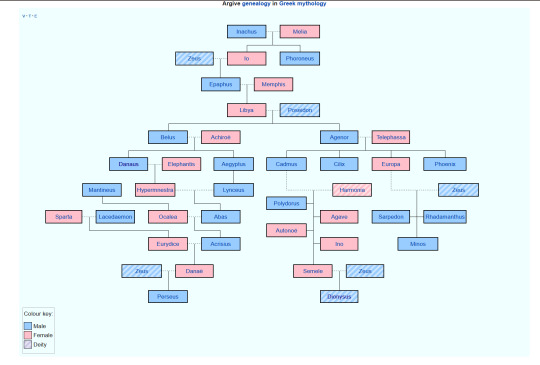
Obviously, one nation cannot come just from one man, and we don't have evidence that Danaans came from Egypt (only some vague linguistic traces because of their name). But it's not impossible. It's very likely that other ethne came from different regions (Egypt, Phoenicia, Anatolia) and slowly mixed with each other to create a more homogenized identity, as people settled more and more in agricultural environments. This early Hellenic identity of "Achaeans" we see for the first time in the Iliad when people from all these kingdoms with similar cultures united under a common cause.
It's important to not call "Danaans" Egyptians, though. At the point we see the peoples called "Danaans", they have developed the early Hellenized culture, distinct from the Egyptian culture of the time. They could potentially have been "Egyptians" a hundred generations back (if we believe their mythological origin story) but when we see them they are interchangeable with Achaeans. They didn't consider themselves Egyptians, and other locals didn't consider them Egyptians (or foreigners) either.
Egyptians don't "claim" the "Danaans" either. I think I should comment on that before any Americans go "Greeks came from Egypt, actually!" In fact, as I mentioned above, Egyptians named them "Denyen" or "Tanaju", like separate peoples from them, and mentioned the Greek cities they lived in.
Achaeans themselves were said to come from the north in 2.000 BCE, Dorians came from the North as well. (We don't know what North™ exactly 😂) Peloponnesians were Dorians but Macedonians were partly Dorians, too.
Achaea (Ἀχαΐα) still exists, btw! I mean... most of our ancient regions and cities still exist but it's nice to see the region kept such an old, really old name! Locator map of Achaia prefecture (Νομός Αχαΐας) in Hellas:
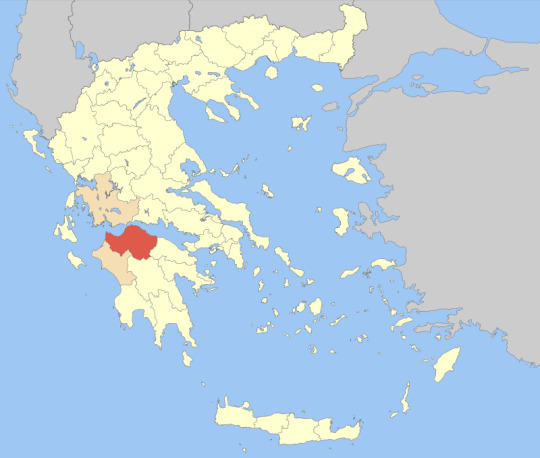
#ethne#ethnoi#tribes#Achaeans#mycenean#trojan war#the iliad#the odyssey#answered#hellenes#hellenismos#ancient greece#academia#classics#history
84 notes
·
View notes
Photo
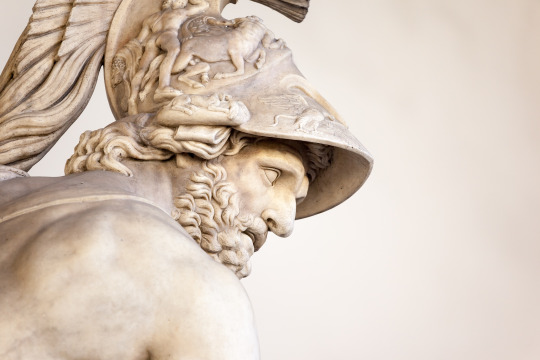
“While so other magnificent works have disappeared, Homer’s works, even though they were no longer supported by any Church or institution, have come to us intact across the centuries and as many upheavals, never ceasing to fascinate and inspire minds, great and small, generation after generation.
Because these sacred poems are the Greek expression of an heritage common to all our European (or Boreans) ancestors, be they Celtic, Germanic, Slavic or Latin”.
- Dominique Venner.
#Dominique Venner#Homer#the Iliad#the Odissey#Greek myth#mythology#European mythology#European identity#Europe#Nouvelle Droite#Alain de benoist#epic poems#Achaeans#Virgil#the aeneid#agamenon#achilles#Trojan war#odysseus#Ithaca#Troy#Trojan horse
24 notes
·
View notes
Text
Sea Peoples' Invasions, Egypt, the Hittite Empire, its Achaean allies, Lukka/Peleset, the Trojan War, Homer's Intentional Falsehood, and the Modern European Forgery 'Ancient Greece'
Book review of the book 'Trojan Horse of Western History' by Anatoly V. Belyakov and Oleg A. Matveyshev
Contents
Introduction
I. The civilized Oriental World & the South Balkan periphery
II. The Hittite imperial order and the disorderly barbarians of Western Anatolia, South Balkans, Crete and the Anatolian Sea
III. The Sea Peoples' invasions as a determinant historical fact and the Trojan War as a worthless falsehood
IV. What is hidden behind the false term 'Achaean World'?
V. Without an in-depth comprehension of the Egyptian, Hittite Anatolian, Canaanite and Mesopotamian civilizations, no one can possibly understand their backward periphery
VI. Why Dio Chrysostom's historical sources are trustworthy and Homer's pretenses are proven red herring
VII. The absolute denigration of the Late Antiquity Greeks by the Ancient Egyptian high priest as the destination of Human History
VIII. Dio Chrysostom's Egyptian sacerdotal interlocutor had read Ramses III's Annals
IX. The fake term 'Ancient Greece' prevents us from assessing Homer's devastating failure
X. Conclusion
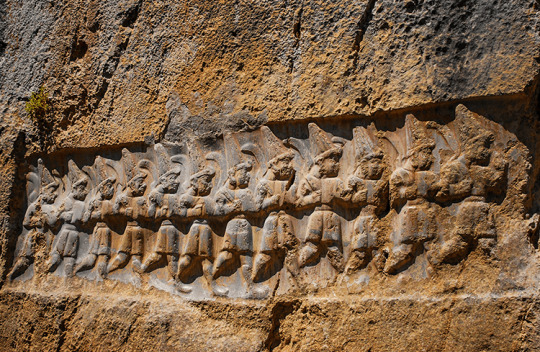
Introduction
What follows is an extensive discussion of the topics presented and the approaches employed in the aforementioned, passionately and impressively elaborated book (St. Petersburg: Piter, 2015 - 256 p.: pic / ISBN 978-5-496-01658-2) that I came to know through an astute Russian friend, shrewd thinker and avid reader.
Links to the Russian and English Wikipedia do not constitute an approval of the texts of the respective entries, but are offered for those among the non-specialized readers of my book review, who wish to launch their own search, starting with the references and the bibliography available of those entries.
Throughout the present article, I use the term 'Anatolian Sea', instead of 'Aegean Sea' which is certainly a historically valid appellation and form of reference. However, the latter term is academically inaccurate. This is so because throughout the last five millennia, we have attested that civilizations, forms of spirituality, religious faiths, cultural trends, ethnic migrations, cults, esoteric beliefs, intellectual movements, artistic and aesthetic tendencies spread from Anatolia to the sea in question, and thence to the South Balkans, and not vice versa. When it comes to Anatolian Sea, which is undeniably a semi-closed sea, we observe that, although various influences and diverse ethnic groups arrived there from the South (Libya), the Southeast (Egypt and Canaan/Phoenicia), and the North (Thrace, Macedonia and the central part of the Balkan Peninsula), the local evolution, historical creativity, and their main factors and aspects depended on Anatolia.
All these scattered islands constitute therefore the Anatolian archipelago and they consist in sheer projection and prolongation of the Anatolian civilization. This was particularly ostensible whenever both lands, Anatolia and South Balkans, belonged to the same empire. Within the Eastern Roman Empire and the Ottoman Caliphate, Anatolia constituted the epicenter and the South Balkans represented a marginal circumference. All the islands in-between depended on Anatolia and never formed an entity of their own.

Download the book review as text only or as text and 130 pictures & legends:
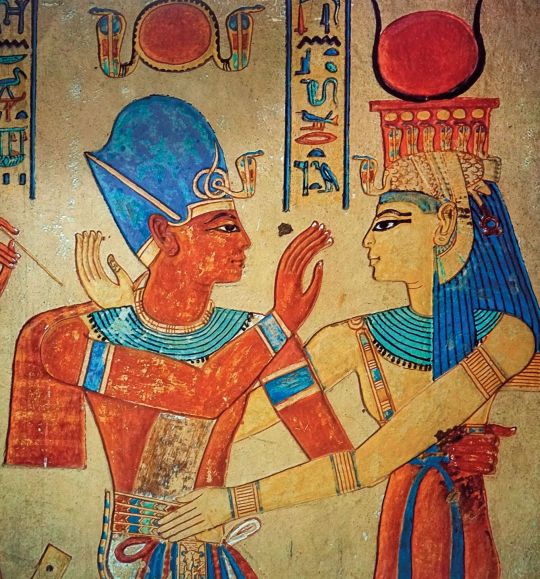


#Sea peoples#Sea peoples' invasions#Egypt#Hittite Empire#Hittites#Lukka#Peleset#Pelasgians#Philistines#Achaeans#Mycenaean#Minoan#Crete#Homer#Ancient Greek epics#Troy#Trojan War#Oleg A. Matveyshev
3 notes
·
View notes
Text
It’s so hard to pick a favorite Achaean, because they’re all so cool and they’ve all committed numerous atrocities.
#however if I HAD to pick#not counting patroclus because that would be unfair to everyone#probably teucer#I have a weakness for archers#note: little ajax is not cool and should not be counted among the cool achaeans#classics stuff#homeric things#iliad#odyssey#homer#achaeans#classical studies#local queer classicist posts
1 note
·
View note
Photo

[id a tweet reading “*buys heavily ripped jeans entirely so I can wear my greaves under them*” by @__femb0t with a picture of them wearing those jeans with plate armour greaves very visible through the ribs. end id]
The next generation of “well-greaved Achaeans” is here, everyone.
0 notes
Note
Can you draw all the solders waddling in like little traffic cones. I saw Achilles in the armour and I just want to see that

I hope that this is what you meant, Anon.
#the iliad#homer#the achaean cone bois#tagamemnon#menelaus#ajax the great#odysseus#achilles#patroclus
927 notes
·
View notes
Text
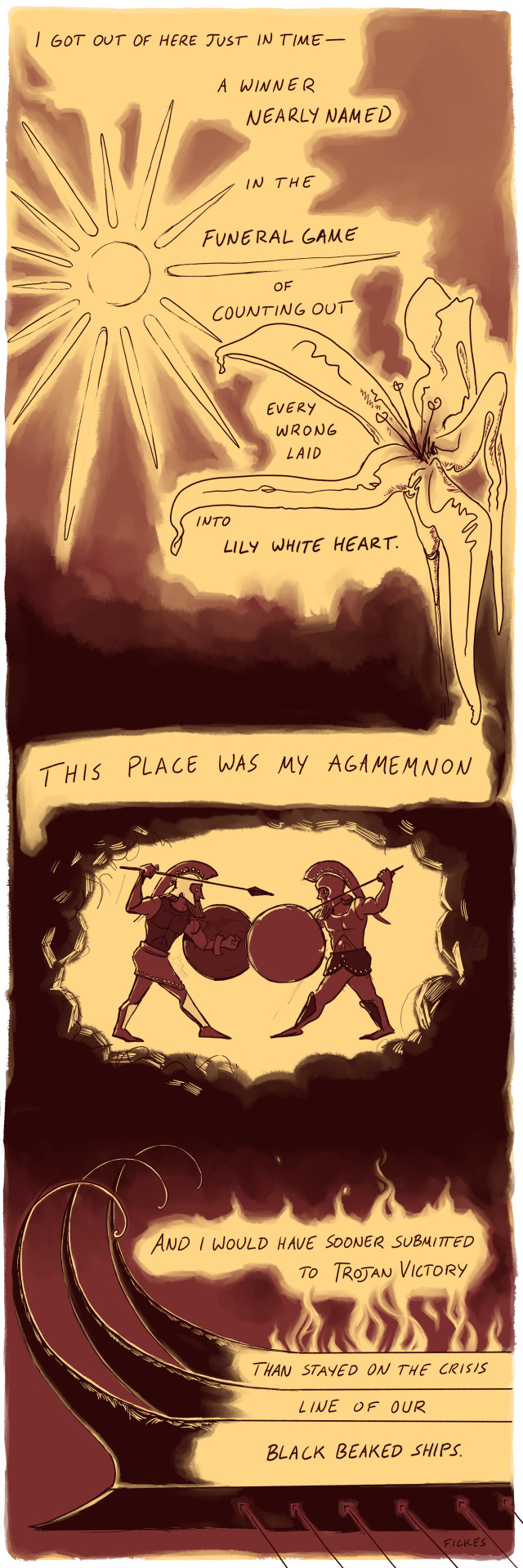
On always making your suffering a goddamn competition
#art#artists on tumblr#illustration#visual poetry#comic#ancient greece#iliad#the iliad#homer#achilles#agamemnon#trojan#achaean#ancient greek#drawing#painting#comics#poetry#artist#queer artist#clip studio paint#digital art#trojan war#classics
112 notes
·
View notes
Text
Odysseus, throughout his 20 years gone: I would not need to learn to manage my anger if more people learned to manage their stupidity.
#His fellow Achaeans#His own army#to Polyphemus#the suitors#The gods#literally everyone but his wife and son are free game for his anger#Even when he should get mad at them (like when Telemachus left the door open for the weapons room) he doesn't. it's so funny.#odysseus#the odyssey#odyssey#the iliad#iliad#tagamemnon#Mad rambles#shot by odysseus
138 notes
·
View notes
Text
*trying to impress girls at the club* you know...i can recite the entire catalogue of ships from the iliad 😏
#yeah it's only like 300 lines it's no big deal#yeah yeah all the Achaean leaders and how many ships they brought#i actually cant i have shit memory#but what a feat it would be if i could!
172 notes
·
View notes
Text
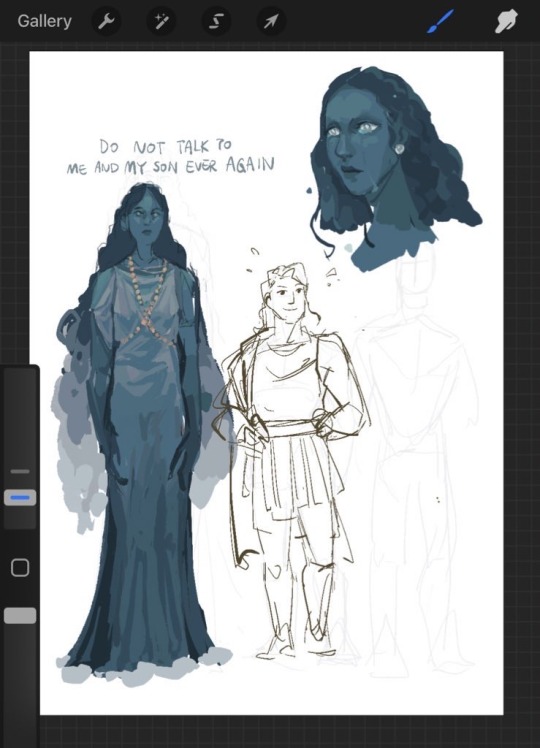
Considering changing my Thetis’s design to be more Mother Supreme
#she’s inhuman she’s not malicious she’s a loving mama she#she send the achaeans quaking in their little boots#ooooh she loves her silly liddle boy#I’m procrastinating on the outline but this is something in it :)#wip#alibonbonn
199 notes
·
View notes
Text
I AM NOT ALRIGHT.
Fall of Icarus. Death of Aegeus. Lost of Hylas. Katabasis of Orpheus. Everything about Oedipus, and Antigone and Ismene. Death of Patroclus. Death of Hector. Death of Ajax. Death of Antilochus. Death of Achilles. Cries of Trojan women. Nostos of Odysseus. Odysseus’s love for Penelope. Odysseus’s meeting with Anticlea. Telemachy.
I’VE BEEN SHEDDING TOO MANY TEARS FOR THIS TRAGIC MYTHOS RECENTLY.
(Oh half of my tags aren’t showing cuz I’ve run out of them.)
#greek mythology#tagamemnon#odysseus#icarus#orpheus and eurydice#oedipus#antigone#patroclus#achilles#hector#telemachus#been hyperfixated on greek mythology too much already#it just can’t go normal without tragedies eh?#the looking back of Orpheus is breaking my heart#he went all the way down to the underworld just to bring his wife home#and all hope was lost when he looked back#DO YOU EVEN KNOW HOW MUCH IT HURTS ME???#And when will I ever get over the story of Achilles and Patroclus?#Patroclus why lingered in the battlefield and never returned?#the fall of troy was completely tragic#the brutality of achaeans led to their melancholy nostoi#not to mention how these brutal actions became the nightmare of all trojans#and there’s always the Ithaca royal family#and who mourns for Hector?#lemme know#wait for me#I’m coming to you#yeah and do you know how much of my thoughts have Hadestown and Epic the musical taken over?#90% if not all#sorry if I’m getting too emotional about them I just can’t help it
18 notes
·
View notes
Text
Some thoughts on deities and what would be considered "their" cities...
You've got Zeus with Troy and Dodona, but what I wanted to talk the most about is Apollo and Sparta.
Apollo being so connected to Sparta in the historical era (though, even there it seems Hyacinthus was first!), it's really easy to assume the same thing applies in myth. I certainly did!
But looking at it... myth-wise you have Delos and Delphi, presumably Pleuron, since in a version of the myth where Apollo kills Meleager, he does so specifically during the battle between the Pleuronians and the Calydonians that spring from the Calydonian boar hunt.
Then Tenedos, Killa, Sminthe - and Troy, if only in relation to the royal family, especially for the Trojan war era. (This not taking into account possible real-world connections one could make for the city itself and "Apalinuna(s)".)
In connection with this, you've got the association of Leto with Lycia and in general the cities/lands around western coastal Asia, and with her her twins.
You know who does claim Sparta (and was worshipped there in historical times, as well), however? Not just claims it but claims it as one of her three most favoured cities?
Hera.
Hera, too, that didn't step in to hinder Herakles when he went against Hippokoon and put Tyndareos back on the throne*. If it's remarkable to Herakles that she didn't hinder him for this, I'd say it's pretty likely it's because she both favours the city and disapproved of Hippokoon usurping Tyndareos' throne. Herakles going against the usurper and putting the rightful ruler back on the throne would then be to her pleasure and she has little cause to actively oppose him even if she isn't going to actively help him either.
(Hell, given that Hera with Hermes gave Polydeukes and Kastor immortal horses, clearly being a bastard son of Zeus matters less when said bastard son(s) is attached to Sparta!)
*Pausanias, Description of Greece 3. 15. 9 :
"The Lakedaemonians [of Sparta] are the only Greeks who surname Hera Aigophagos (Goat-eater), and sacrifice goats to the goddess. They say that Herakles founded the sanctuary and was the first to sacrifice goats, because in his fight against Hippokoon and his children he met with no hindrance from Hera, although in his other adventures he thought that the goddess opposed him.
#greek mythology#apollo#hera#greek myth thoughts#not that one can't have Hyacinthus upset Apollo is 'betraying' Sparta#because as a potential bit of relationship conflict that is way too juicy#to just wave away#there's after all Apollo's connection to Hyacinthus#and with that to Sparta#and Hyacinthus' mother can be a granddaughter of Apollo#and lastly - just Hyacinthus assuming that OF COURSE#Apollo would be on the Achaean side...
20 notes
·
View notes
Text
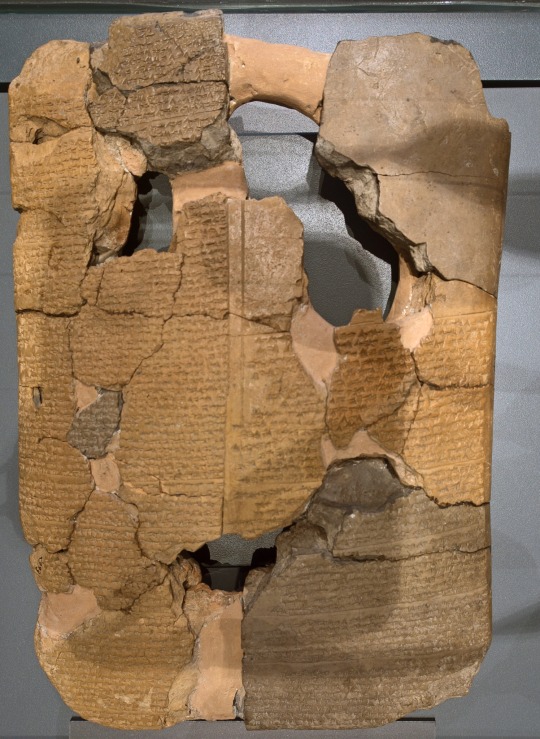
this was when internet memes began
#image#this is the#alaksandu treaty#from 13th century bce#which mentions hittite wilusa#bronze age anatolia at peak power babey#there r hittite records from around then that mention conflicts over the city#which mention achaean intercessors#slay
26 notes
·
View notes
Text
So in the Odyssey we found out Nestor has a daughter called Polycaste who he allows to bathe Telemachus and in some versions of post-Odyssey life the two of them are married, which implies that she is either of age with or younger than Telemachus. Telemachus is as old as how long Odysseus has been gone; 20 years. So Polycaste was either just a baby like Telemachus when their fathers set off to Troy, or (and personally I find this possibility more interesting) Nestor's wife was pregnant with her when he left.
And like, imagine you're Nestor and you're finally returning home after ten years of war and are probably dreading having to tell your wife that one of your sons died at Troy. And you come home and find out you now have a 9-10-year-old daughter who probably doesn't even know who the fuck you are or any emotional connection to the brother she lost. Not to mention that those two brothers who went to war were probably old enough to be fathers themselves so she may very well be an aunt to children fairly close in age to herself. Like can you imagine how awkward and uncomfortable that would have to have been for all parties involved?
And then Telemachus just comes along years later looking for info on his dad and Nestor just decides to play matchmaker.
There isn't really a point to all this. I just felt like rambling about Classics again.
#greek myth#greek mythology#homer#the odyssey#the iliad#nestor#telemachus#polycaste#like sometimes i just think about how much time all the men in the Achaean army lost even if it wasn't for twenty years like odysseus#their kids literally grew up without them#who knows how many of them had kids born just months after they left that just spent the first decade or their lives without a father#i just imagine these kids being very confused#and just thinking “why the fuck is this dude in our house and why does he keep wanting me to call him dad?”
44 notes
·
View notes
Note
Do you know the approximate ages of all the main characters in The Iliad?
Hi anon! I haven't looked into this topic before tbh, and I feel like researching it thoroughly will take up a lot of time, so these are just off the top of my head!
Achilles was a teenager when Agamemnon called the men of Hellas to sail to Troy. By the time of the Iliad, he must be in his late 20s.
Patroclus is described as being slightly older, and therefore wiser, than Achilles and is sent to Troy to counsel him. So he must be in his early 30s in the Iliad.
Ajax is Achilles' cousin, and is said to have been trained by Chiron too. But I'm not sure if they trained at the same time? Telamon, Ajax's father, is the elder brother of Peleus, so if we assume that both these men had their kids at about the same age, then Ajax would be at least a few years older than Achilles. Maybe Ajax was sent to Chiron first, and then Achilles followed. I'm really not sure haha. But I would say he must be about mid to late 30s.
The sacrifice of Iphigenia is one of those myths that not everyone accepts as part of the Iliad, but I am one of those that believe that it should be read into the greater myth of the Iliad and the Epic Cycle (for various reasons that I will not go into now lol). Agamemnon and Clytemnestra had four kids, and Iphigenia was the oldest, who at the start of the Trojan war was at marrying age (let's say about 15). That means that Agamemnon must have been at the very least in his mid 30s when the war started (although men generally married older than the women). So in the Iliad he should be at least mid to late 40s.
Menelaus is Agamemnon's younger brother, so.... let's say he's late 30s, early 40s when the Iliad starts? Give or take?? My impression is that he's a quite a bit younger than Agamemnon but I don't remember a specific passage about it right now.
Odysseus left Ithaca after Penelope had just had Telemachus, so that would have been in the first or second year of their marriage. He must have been at least in his 20s when that happened, let's say mid to late twenties. He must be mid to late 30s in the Iliad.
Nestor is described as having seen two generations of men, and that he's still ruling as king in the third age, so I would assume he's FUCK old lmao. Probably 70s-80s in the Iliad, I would say.
Hector is Priam's oldest son by Hecuba, and he has 19 siblings by the same mother. The youngest son, Polydorus, is old enough to meet Achilles on the battlefield in the Iliad. I'm not sure in which order the children were born, but if we assume that Hector has at least a 10 year age difference with Polydorus, and that Polydorus is at least 15 in the Iliad, then we're already looking at a man who is in his mid to late 20s at the very least. But he's most definitely much older than that, because...
Helen's daughter, Hermione, is quite young when Helen leaves with Paris, but I'm not sure how old exactly. What we do know is that Helen spends 10 years in Troy before the Achaeans arrive, and then there's 10 more years of the war, so at the time of the Iliad she must be... late 30s? At least? And Paris is probably around the same age as her. And if Paris is in his late 30s, and he's Hector's younger brother, then Hector is even older than him. Which means that Hector is probably in his early 40s.
Priam has a ton of children, and he is generally described in the Iliad as a kindly and mild-mannered old man, so I would place him about Nestor's age. Virgil in his Aeneid has Priam be in his 80s when Troy is sacked, and I think that estimation is correct.
I think these are the main characters?? Don't think I've missed anyone lol. As I said, these are off the top of my head so if anyone has any corrections or additions they're welcome to add them <3
#the iliad#homer's iliad#we really go into fucky territory with some of these i think#many contradictory accounts over Hecuba and how many children/sons she had#i also didn't mention andromache and briseis bc there's not much to suggest their ages i don't think? other than them being quite young#i would say mid to late twenties in the iliad#given that andromache's only child is a baby and i thiiiiink briseis had been freshly married when the achaeans sacked lyrnessus?#anywho feel free to correct me if i'm wrong!#tagamemnon
7 notes
·
View notes
Text
Saw a post earlier about how people dunk on Agamemnon because of "bad media literacy" and needing to make Achilles look better, and I'm like, lmao, I dunk on Agamemnon because Homer wrote him as an absolute buffoon
#by book 2 hes made a complete fool of himself#he never gets a redemption arc#by the end of the book the Achaeans are booing when he speaks#like...#that post also aaid Achilles anger was written as a warning#which is just... a take but definitely not definitive proof#I'd say he wrote Agamemnon to show the dangers of incompetent leadership#book opens with Agamemnon refusing to give back a daughter and basically being forced and still not accepting it#causing the Achilles conflict#book ends with Achilles giving back a son peacefully and asking nothing in return#Agamemnon's armor slaps tho ill give him that#LITERALLY CANNOT BE TRUSTED TO PARTICIPATE IN FUNERAL GAMES
8 notes
·
View notes